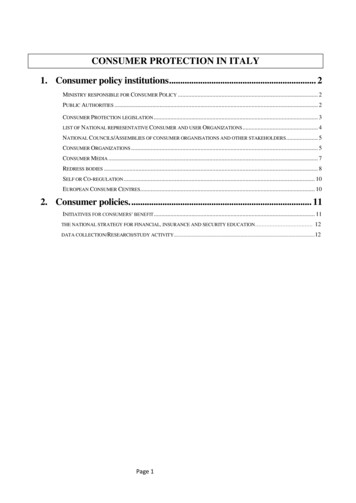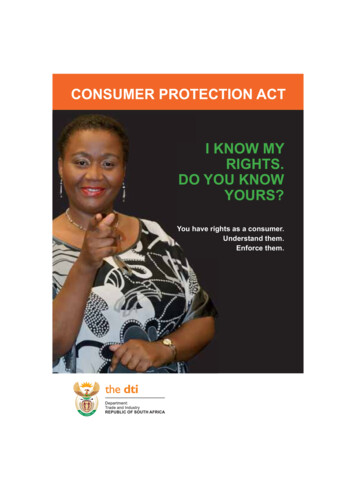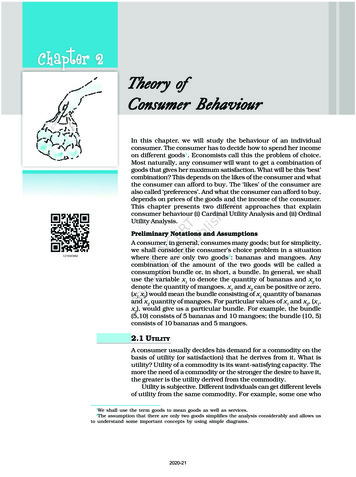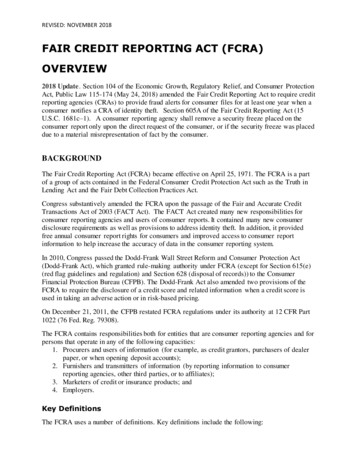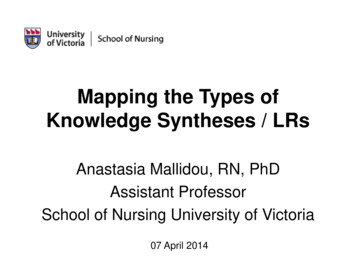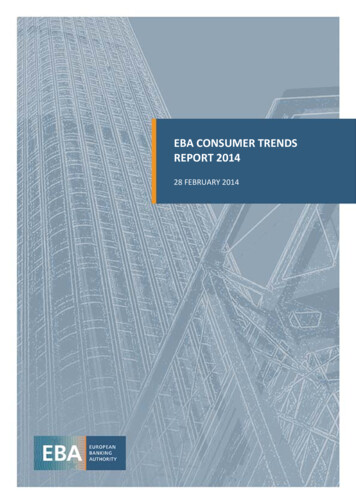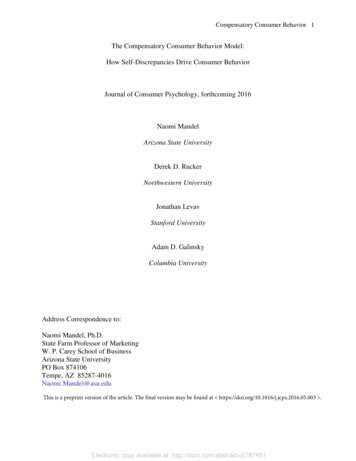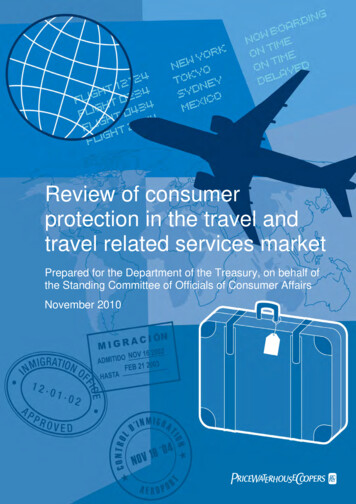
Transcription
Review of consumerprotection in the travel andtravel related services marketPrepared for the Department of the Treasury, on behalf ofthe Standing Committee of Officials of Consumer AffairsNovember 2010
This document was prepared for the Standing Committee of Officials of Consumer Affairs (SCOCA). Inpreparing this document we have only considered the circumstances of SCOCA. This document is notappropriate for use by persons other than SCOCA, and we do not accept or assume responsibility toanyone other than SCOCA in respect of the document.This document is intended to be printed double sided.tment of the Treasury, on behalf of the Standing Committee of Officials of Consumer Affairsrs2
Key messages and recommendationsThe following are PricewaterhouseCoopers’ key observations and recommendations from our review ofconsumer protection in the travel and travel related services industry, separated according to the threecomponents of the review’s Terms of Reference.The need for consumer protection measures in the travel industry1For the most part, competitive markets underpinned by generic consumer protection rules, somevoluntary accreditation and some private measures provide an adequate and appropriate level ofconsumer protection in the travel industry.2Historically, protecting the carriage of monies by travel agents and volatility in that market was thedriving rationale for the existing travel agency regulatory scheme, the only industry specificconsumer protection regulation in the travel industry. Subsequent developments suggest that thereis no longer sufficient justification for industry-specific consumer protection regulation in this sectorand that the existing scheme is now not fit for purpose.3Consumer protection concerns in the airline industry have been raised. These wereacknowledged, and are being addressed, by recommendations in the Australian Government’sAviation White Paper.The relevance, effectiveness and viability of the current travel agencyregulatory scheme4The travel agents licensing scheme is the only industry-specific consumer protection regulation inthe travel industry, and includes training requirements, administration and disclosure rules, and acompulsory prudential oversight and compensation scheme.5The licensing framework provides little consumer benefit while imposing regulatory cost onbusiness. Its state/territory basis imposes unnecessary cost and does not reflect the nationalnature of the market.6The compensation scheme administered by the Travel Compensation Fund (TCF) has performedwell in improving consumer protection since its introduction in the 1980s. The industry has,however, changed radically over this time, and the risks to consumers associated with the collapseof a travel agent have significantly reduced.–More and more consumers are purchasing direct from travel suppliers or via credit cards; inwhich case their funds are not at risk from travel agent collapse.–Market consolidation and the declining market share of smaller agencies have improved theability for consumers – through media coverage of large companies – to better assess thesolvency of businesses in the industry.–Increasing consumer affluence and familiarity with travel, combined with the declining realcost of travel, make travel purchases a less significant household purchase.–The economic cost of the scheme is in the order of nine times greater than the averagevalue of claims paid.7Consumers appear to value protection from travel agent insolvency, being willing to pay, at aminimum, 30 on a 1,000 fare for such protection. Consumers are however largely unaware ofthe current scheme and, therefore, this willingness to pay represents the value they place onavoiding the potential for loss (ie rather than the value of the current scheme per se). Accordingly,the question for this review is whether the current scheme is the optimal framework for thisprotection to be provided.8On the evidence, the compensation scheme appears unduly burdensome relative to the risk ofconsumer detriment from travel agent collapses and represents a disproportionate regulatoryresponse relative to consumer protection regulation in other industries. On balance, there isinsufficient justification to maintain the current scheme with its attendant costs.
Regulatory and non regulatory options to address consumer protection issues9PwC believes that the industry-specific consumer protection regulations in the travel agentsmarket are no longer fit for purpose, and that the scheme should be reformed to better meet thecurrent and future needs of the sector.10PwC recommends that consumer protection in the travel industry, including travel agents, becentred on the generic provisions of the proposed Australian Consumer Law, supported byvoluntary accreditation under the National Tourism Accreditation Framework.11PwC recommends that the existing travel agents licensing scheme be replaced with a mandatoryregistration scheme, that is administered by a single national body and imposes minimal‘character’ entry requirements (such as a ‘fit and proper person’ test) and selected conductrequirements (such as disclosure obligations and a code of conduct).12PwC recommends that an accreditation scheme, licensed under the National TourismAccreditation Framework, be established for travel agents and other travel intermediaries. PwCalso recommends that the option of expanding the scope of the proposed Aviation Ombudsmanand creating an enforceable industry code under the Australian Consumer Law be explored in linewith the timing of these two initiatives.13PwC recommends that the insolvency protection functions of the Travel Compensation Fund(prudential oversight and compensation) be discontinued. The phased wind-up of the fund shouldbe implemented in line with the implementation of other recommendations in this report.14PwC recommends that detailed consideration be had as to the appropriate mechanism forimplementing these reforms. A detailed transition plan is outlined in the body of this report.15PwC acknowledges that reform decisions may be informed by other policy considerations beyonda pure cost-benefit analysis. Accordingly, PwC has also outlined recommendations for reform ofthe existing compensation scheme that improve the scheme’s operation while retaining someconsumer protection from travel agent insolvency.tment of the Treasury, on behalf of the Standing Committee of Officials of Consumer Affairsrs4
ContentsKey messages and recommendations3Executive summaryiiiPrefacexi1Context of this review12Current consumer protection measures in the travel industry253The need for consumer protection in the travel industry544The effectiveness of the existing travel agents regulatory regime825Reform options for insolvency protection ndices150Appendix BSubmissions received151Appendix CStakeholders consulted153Appendix DTravel agents regulation in other jurisdictions156Appendix EDun & Bradstreet business risk data163Appendix FPwC consumer survey166Appendix GPwC travel agents survey169Appendix HPotential alternative uses of TCF reserves174
AbbreviationsABSAustralian Bureau of StatisticsACCCAustralian Consumer and Competition CommissionACLAustralian Consumer LawAFTAAustralian Federation of Travel AgentsAPRAAustralian Prudential Regulation AuthorityASICAustralian Securities and Investment CommissionASXAustralian Securities ExchangeATECAustralian Tourism Export CouncilATOLAir Travel Organiser’s LicenceBITREBureau of Infrastructure, Transport and Regional EconomicsBSPBilling and Settlement Plan (IATA)CATOCouncil of Australian Tour OperatorsCOAGCouncil of Australian GovernmentFCLFlight Centre LimitedGDPgross domestic productESOSEducation Services for Overseas StudentsIATAInternational Air Transport AssociationNGFNational Guarantee FundNLSNational Licensing SystemNTAFNational Tourism Accreditation FrameworkOH&Soccupational health and safetyPDSproduct disclosure documentPwCPricewaterhouseCoopersRBAReserve Bank of AustraliaSCOCAStanding Committee of Officials of Consumer AffairsTAANZTravel Agents’ Association of New ZealandTCFTravel Compensation FundGlossaryExternaladministrationDue to insolvency or other problems the company is being administered byan outside agency appointed by the company, a liquidator or a chargee.National SchemeThe National Co-operative Scheme for the Uniform Regulation of TravelAgents, introduced in 1986 and subsequently adopted by all Australianstates and territories.PwC ConsumerSurveyA survey of consumers on a range of issues relating to consumerprotection in the travel industry and on their willingness to pay for suchprotection. The study was conducted on PwC’s behalf by TNS Group andsurveyed a random sample of over 800 travel consumers.PwC Travel AgentsSurveyA survey of Australian travel agents (distributed to all TCF members, 415responses received) on a range of issues relating to consumer protectionin the travel industry and the existing regulatory regime.Travel agentsFor the purposes of this report, travel agents refers to businesses requiredto be licensed as ‘travel agents’, in accordance with the provision of thevarious Travel Agents Acts of each Australian state and territory. Thisdefinition refers to persons or businesses carrying on a business of selling(or arranging, making available, purchasing for resale or advertising tosell) travel or travel and accommodation. See section 2.2 for more detail
Executive summaryOur taskPricewaterhouseCoopers (PwC) has been requested to conduct areview of consumer protection in the travel and travel relatedservices market, and to: identify and review the effectiveness of, or need for,consumer protection measures in the travel and travel relatedservices market, particularly in relation to consumerprepayments for services consider the relevance, effectiveness and viability of thecurrent travel agency regulatory scheme, with a particularfocus on the operation of the Travel CompensationFund (TCF) identify and consider regulatory and non-regulatory optionswithin a cost/benefit framework to addressconsumer protection issues at a Commonwealth andState/Territory level.Our work is cognisant of previous other reviews in this sectorincluding the National Competition Policy review in 2000.1Our approachOur approach has been to consider the need for consumerprotection measures in light of the nature and objectives of bestpractice consumer protection. This included considering theprinciples of best practice consumer protection, the approachesadopted in other industries and lessons learned from theirexperience and the broader consumer protection frameworkin Australia.This approach was applied to the particulars of the Australian travelindustry via an examination of the markets, segments,players and circumstances of the travel industry. Accordingly, ourreview included: 1PricewaterhouseCoopersa review of the existing regulatory and non regulatoryconsumer protection framework in the Australiantravel industry and relevant and comparableinternational jurisdictionsSee Centre for International Economics (2000) ‘National Competition Policy review ofthe National Scheme for the Regulation of Travel Agents’ and Working Party report toMinisters. This review can be obtained from the National Competition Policy website:http://ncp.ncc.gov.au/.iii
Executive summary soliciting contributions from interested parties, including:–the release of an Issues Paper–review of the submissions–face-to-face and telephone consultation with acomprehensive mix of consumer, industry andgovernment stakeholders. surveys of industry and consumers an analysis of available data and other information.Our findingsThe industryThe travel industry is diverse. It incorporates many different marketsand segments, with nuanced characteristics, trends andcircumstances in each. With some exceptions, travel markets aretypically highly competitive and dominated (in number at least) bysmall businesses.The travel industry has undergone major changes in its operationdue to the advent and uptake of technology (most importantly theinternet). In parallel with these changes, the industry has seen thegrowth of electronic payment methods. These changes have comeduring a period of increasing travel by Australians due to, amongstother things, the declining relative cost of travel.There is also a broad trend towards consolidation in previouslyunconsolidated sectors of the market; most notably, travelintermediaries. These developments have had a profound effect onthe industry, including changing the nature of the supply chain bywhich consumers have historically accessed travel products. Thisimpact is demonstrated by Figure ES1, with technology increasingthe number of transaction avenues available to the consumer.PricewaterhouseCoopersiv
Executive summaryFigure ES1 – Travel industry supply merCommunications TechnologyTravel AgentTourWholesalerTour OperatorHistorical supply chainAlternative channelsThese developments have improved the choice and informationavailable to consumers, while reducing their vulnerability toconsumer protection issues historically present in the market.The existing consumer protection frameworkThe centrepiece of consumer protection regulation in Australia is thegeneric provisions of Fair Trading Acts and the Trade Practices Act,applicable to all industries. These are being harmonised nationallyunder the Australian Consumer Law initiative, which is due to be fullyeffective and implemented by January 2011.While primary reliance for consumer protection regulation should beplaced on the generic rules applicable to all industries, there may besome limited circumstances in which industry-specific provisions areappropriate. Nevertheless, a clear need for additional consumerprotection should be demonstrated; for example, a particularly greatrisk of consumer detriment and/or inadequate opportunities forprevention, redress or non regulatory protection.In the travel industry, industry-specific consumer protectionregulation is currently focussed on travel agents. A compulsorylicensing regime and an insolvency protection scheme are in place.Together these measures attempt to achieve three key objectives.PricewaterhouseCoopers Competency – protecting consumers from inadequate servicefrom travel agents, to the extent this is the result ofincompetence on behalf of the travel agent. Compensation – providing compensation to consumers wholose funds in the event of a travel agency collapse, includingprudential oversight to minimise such occasions. Conduct – improving business conduct in the industry via thedisciplinary powers vested in the relevant licensing authority.v
Executive summaryOther industry-specific measures are being developed, including anational accreditation framework for the tourism industry and anindustry ombudsman for the aviation sector.A range of non regulatory measures are also present. These includeindustry associations’ codes of conduct, commercial arrangementsand some private sector protection (credit card charge-back andtravel insurance).The need for consumer protectionFor the most part, competitive markets underpinned by genericconsumer protection rules, some voluntary accreditation and someprivate measures provide an adequate and appropriate level ofconsumer protection in the travel industry.Notwithstanding, legitimate concerns have been raised about twoareas where the risk of consumer detriment, and the lack ofopportunities for redress, are potentially unacceptable.These areas are: inadequate service (in a variety of markets) the loss of prepayments (particularly in relation to travelagents and air travel).There is little evidence of substantial consumer protection issuesrelating to poor service in the travel industry. The area that wasraised by stakeholders however, related to the air travel industry –cancellations, delays, service quality and travel insurance – ratherthan travel agents. Substantial measures to address these concernshave already been proposed by the Australian Government’sAviation White Paper. These measures should be explored.A further initiative in relation to quality service is the NationalTourism Accreditation Framework (NTAF). The NTAF aims topromote improved quality and better outcomes for consumers via anumbrella scheme that supports and empowers accreditationprograms across a number of regions and industry sectors. Thisinitiative appears sufficient to address other consumer protectionconcerns relating to inadequate service in the industry.The risk of losing prepayments in the event of business insolvencywas the driving rationale for the introduction of specific regulation oftravel agents in the 1980s. Since that time, a number ofdevelopments have occurred which substantially reduced the risk ofconsumer detriment for agency collapses.PricewaterhouseCoopers Increasing household incomes and consumers’ familiarity withtravel, combined with the declining real cost of travel, maketravel purchases a less significant household purchase. Consumers have greater access to information and the abilityto contract direct with suppliers via electronic payments andthe internet. More and more consumers are doing so, in whichvi
Executive summarycase their funds are not at risk from travel agent collapse.The popularity of credit card usage also reduces the amount offunds exposed to this risk. Market consolidation and the declining market share(in terms of revenue) of smaller agencies have improvedmarket oversight of the solvency of businesses in the industry.At present, the available evidence suggests that the risk ofconsumer detriment is not sufficient to justify substantial regulatoryintervention in this market. In addition, some private sector optionsare also available to consumers to protect themselves againstthese risks.The effectiveness of the current travel agents regimeWhile it is likely that the travel agents consumer protectionframework has served a good purpose since its introduction in the1980s, in many ways the measures in the regime are duplicative,obsolete, disproportionate and/or poorly targeted to achieve desiredconsumer protection outcomes.Consumers value consumer protection in this sector, including beingwilling to pay a considerable component of their travel fare(at a minimum, 30 of a 1,000 fare) to obtain protection from travelagency bankruptcy. Estimates of the total willingness to pay forinsolvency protection in this sector exceed the estimated cost of theregulatory scheme. For the most part however, consumers areunaware of the existing regime. The willingness to pay therefore isnot a value of the current scheme, but rather a representation oftheir aversion to a loss and the value they place on protection.Industry also value consumer protection in the sector, but are criticalof a number of elements of the current framework.The licensing framework could retain its beneficial componentsunder a substantially less onerous scheme. In particular, in relation to competency, the training/experiencerequirements are poorly targeted and, in the most part,superseded by industry practice in relation to conduct, the enforcement powers largelyduplicate the provisions of the generic consumer protectionlaws – key enforcement powers provided to licensingauthorities can be achieved under the provisions of theproposed Australian Consumer Law.In short, there are few grounds for departure from the genericconsumer protection provisions in this industry. The regime also failsto reflect the national nature of the market. It remains a state basedsystem and creates unnecessary duplication for businessesoperating in multiple jurisdictions.PricewaterhouseCoopersvii
Executive summaryIn relation to insolvency protection measures, the schemerepresents an onerous and disproportionate measure, given: the approach taken in other comparable industries, includingthose that pose a similar or greater risk of consumer detrimentor are of greater systemic importance to theAustralian economy the annual regulatory burden of the scheme is significantlyhigher than the level of funds paid out improvements in the vulnerability of and choice available toconsumers from the growing uptake of information technologyand electronic payment options consolidation of the market and the growth of larger players,which gives greater capacity for consumers to observeindications of business solvency through media coverage ofrating agencies statements or ASX disclosures.Meanwhile, the licensing and insolvency protection regimesimpose a significant financial and administrative cost on travelagent businesses.In relation to licensing, the costs include: a financial cost to business (ie annual licensing fees) totalling,industry wide, approximately 1.4 million per annum staff time to complete compliance tasks, costingbusinesses a total of 270,000 per annum – these costs maybe compounded by businesses who are licensed acrossmultiple states the completion of required training courses, with anestimated financial cost of 800 and staff time costs of 1,200 – representing an estimated total cost to industry of 4.3 million per annum.In relation to the compensation scheme, the total cost is estimated at 19.3 million per annum, including: the operating costs of the TCF(approximately 2.8 million per annum) compliance activities of businesses (estimated at 3.2 millionper annum) the requirements to prepare audited financial accounts( 4.8 million per annum) the provision of securities ( 2.5 million per annum) the retention of excess capital reserves( 6.0 million per annum).In total therefore the cost of the regulatory scheme – includinglicensing and compensation – is 25.3 million per annum relative tothe average pay-out to consumers of 2.9 million (averaged over thePricewaterhouseCoopersviii
Executive summarylast 10 years). The regulatory costs are therefore around nine timesthe current value of consumer funds lost.Our recommendationsOverarching framework for consumer protectionThe consumer protection framework for the travel industry should bebuilt on two key elements: voluntary accreditation under the NTAF for all travelbusinesses, supported by, in relation to travel agents, anational registration scheme the generic consumer protection provisions of the proposedAustralian Consumer Law (ACL).The majority of PwC’s recommendations in this respect reflect thestatus quo or initiatives that are already in train (eg the developmentand implementation of the NTAF and ACL). Our recommendationshowever lend support for consideration of an extension to themandate of the proposed Aviation Ombudsman, to include referenceto the entire travel industry.With respect to travel agents however, our recommendationsrepresents substantial reform.Reform of the existing travel agents licensing regimeIt is clear from all stakeholders and from the available evidence, thatsignificant reform is necessary in this sector. Put simply, the statusquo is not appropriate. Stakeholders differ in their opinions on thenature and scale of reform necessary.With respect to the licensing regime, PwC recommends replacingthe existing provisions with: a registration scheme that:–is a single nationally administered scheme–removes existing competency requirements, includingthe mandated training–retains basic disclosure and ‘fit and proper person’character requirements an accreditation program, developed in conjunction withindustry, for the sector consistent with the NTAF the option of an enforceable industry code of conduct underthe ACL.Having reviewed the need for insolvency protection of travel agents,a demonstrable case for regulatory protection was not found.PricewaterhouseCoopersix
Executive summaryAt the same time, the scheme imposes a substantial economic coston the industry.PwC recommends the removal of all insolvency protection from thecurrent regulatory framework.Should this option not be preferred by government, PwC also seessome merit in two alternatives: the development of an industry-ledcompensation scheme, or various enhancements to the regime in itscurrent state.Careful consideration should be had to the implementation of theserecommendations. Accordingly, a phased implementation planis recommended.PricewaterhouseCoopersx
PrefaceOn 8 May 2009, the Ministerial Council on Consumer Affairs directedthe Standing Committee of Officials of Consumer Affairs (SCOCA) tocommission a review of consumer protection in the travel and travelrelated services market. PricewaterhouseCoopers (PwC) wasappointed by SCOCA to undertake this review.BackgroundUnder the Terms of Reference in the Consultancy Contract betweenPwC and the Commonwealth Department of the Treasury (on behalfof SCOCA), the review is to: identify and review the effectiveness of, or need for,consumer protection measures in the travel and travel relatedservices market, particularly in relation to consumerprepayments for services consider the relevance, effectiveness and viability of thecurrent travel agency regulatory scheme, with a particularfocus on the operation of the Travel Compensation Fund identify and consider regulatory and non-regulatory optionswithin a cost/benefit framework to address the identifiedconsumer protection issues at a Commonwealth andState/Territory level.PwC has considered consumer protection issues in connection withthe provision of travel and travel related services in the Australianmarket place, including services provided directly or indirectly bypersons carrying on business in Australia to both inbound andoutbound tourists as well as business travellers in connection withtravel inside and outside Australia.For the purposes of this review, travel services include air, sea andland transport, while travel related services include vehicle rental,accommodation, sightseeing tours, special events and otherservices associated with travel (such as finance and insurance).Suppliers of travel and travel related services include principals(those who directly provide the services) and intermediaries (thoseinvolved in making arrangements).The consumer protection measures in this industry, in particularthose concerning travel agents, have been the subject of severalreviews, including a National Competition Policy review in 20002 andan unpublished TCF review of the TCF’s capital adequacy andcapital requirements in 2004 (driven by the collapse ofAnsett/Traveland in 2001). This review is cognisant of the analysisand recommendations of these reviews and builds on them in light ofmore recent developments.2PricewaterhouseCoopersCentre for International Economics (2000) ‘National Competition Policy review of theNational Scheme for the Regulation of Travel Agents’.xi
PrefaceReview methodologyPwC’s methodology for this review included the following activities. A review of the existing regulatory and non regulatoryconsumer protection framework in the travel industry. The release of an Issues Paper highlighting the key issues forour review and inviting submissions from interested parties. Review of the 32 submissions received in response to theIssues Paper. A list of submissions received is provided inAppendix A. Face-to-face and telephone consultation with acomprehensive mix of consumer, industry and governmentstakeholders. A full list of persons/organisations consulted isprovided in Appendix B. A review of travel agent regulation in otherinternational jurisdictions. A summary of our findings inprovided in Appendix C. A review of business risk data prepared for this review by Dunand Bradstreet. Information on Dun and Bradstreet’s data,including their approach to collecting data and the full results,is provided in Appendix D. A survey of over 800 consumers in relation to consumerprotection in the travel industry. The survey is set out inAppendix E. A survey of all Australian travel agents participating in the TCFrelating to the regulatory scheme for travel agents. The surveyis set out in Appendix F. An analysis of available data relating to consumer complaints,business failures and other consumer protection matters.AcknowledgementsPwC is grateful for the assistance of many stakeholders and otherinterested parties throughout the conduct of this review. In particularwe were greatly assisted by the following organisations: the Travel Compensation Fund, and in particularMr Glen Wells the Australian Federation of Travel Agents, in particularMr Jayson Westbury.We would also like to thank the various industry representatives,government stakeholders and consumer groups that have assistedus throughout the course of this review. A full list of participatingstakeholders is contained in Appendix B.PricewaterhouseCoopersxii
PrefaceStructure of this reportThis report documents the analysis, findings and recommendationsof our review. It is structured as follows.PricewaterhouseCoopers Chapter 1 outlines the context of our review by definingconsumer protection and discussing the nature, dynamics andrecent developments in the travel industry. Chapter 2 outlines the current regulatory and non regulatoryconsumer protection framework in the travel industry, includingthe industry-specific regulations applicable to travel agents. Chapter 3 considers the need for consumer protectionmeasures in the travel industry, based on observations fromChapter 1 and 2, available data and information and the statedconcerns of stakeholders. Chapter 4 reviews the effectiveness of the current regulatoryregime in addressing key consumer protection concerns, inlight of these concerns and broad policy objectives. Chapter 5 outlines six options to reform the existing insolvencyprotection scheme relating to travel agents. Chapter 6 outlines PwC’s recommended reforms, including anoverarching consumer protection framework for the travelindustry and reforms to the existing travel a
consumer protection regulation in the travel industry. Subsequent developments suggest that there is no longer sufficient justification for industry-specific consumer protection regulation in this sector and that the existing scheme is now not fit for purpose. 3 Consumer protection concerns in the airline industry have been raised. These were
